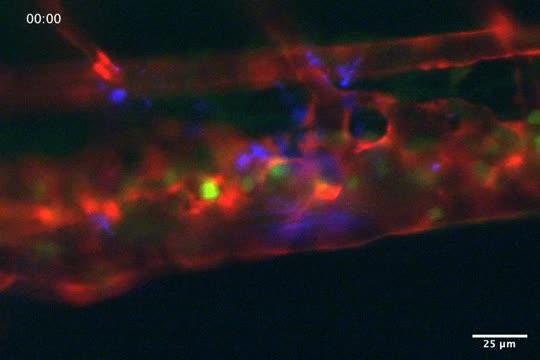
VIDEO: Green platelets sticking to red blood vessels next to sites of infection by blue bacteria. Pathogenic platelets are the green cells that stick next to the bacteria for a few… view more
Research led by the Centenary Institute in Sydney has found a brand new target for treating drug-resistant tuberculosis; our scientists have uncovered that the tuberculosis bacterium hijacks platelets from the body’s blood clotting system to weaken our immune systems.
Tuberculosis is far from eradicated around the world and still infects more than 1,400 people per year in Australia. Antibiotic resistant tuberculosis is particularly deadly and expensive to treat, costing up to $250,000 to treat a single case in Australia. Scientists at the Centenary Institute have been working on new ways to treat tuberculosis by increasing the effectiveness of the immune system.
Using the zebrafish model of tuberculosis, the researchers used fluorescent microscopy to observe the build-up of clots and activation of platelets around sites of infection (see supporting videos https:/
Following their hunch that these platelets were being tricked by the infection into getting in the way of the body’s immune system, the researchers treated infections with anti-platelet drugs, including widely available aspirin, and were able to prevent hijacking and allow the body to control infection better.
Dr Elinor Hortle, lead author of the paper published in The Journal of Infectious Diseases, and Research Officer in Centenary’s Immune-Vascular Interactions laboratory says “This is the first time that platelets have been found to worsen tuberculosis in an animal model. It opens up the possibility that anti-platelet drugs could be used to help the immune system fight off drug resistant TB”.
There are over 1.2 million Australians living with latent tuberculosis, a non-infectious form of TB that puts them at risk of developing the active disease. “Our study provides more crucial evidence that widely available aspirin could be used to treat patients with severe tuberculosis infection and save lives,” says Dr Hortle.
###
To arrange an interview with Dr Hortle or Dr Oehlers, please contact Karen McBrien, Marketing Manager, Centenary Institute on 0408 601 836.
For more information about Centenary Institute, and the Immune-Vascular Interactions Laboratory visit //www.
About the Centenary Institute
The Centenary Institute is a world-leading independent medical research institute, closely affiliated to the University of Sydney and the Royal Prince Alfred Hospital. Our research focuses on three key areas: cancer, inflammation and cardiovascular disease. Our strength lays in uncovering disease mechanisms and applying this knowledge to improve diagnostics and treatments for patients.
See the full paper in The Journal of Infectious Diseases here https:/
Disclaimer: AAAS and EurekAlert! are not responsible for the accuracy of news releases posted to EurekAlert! by contributing institutions or for the use of any information through the EurekAlert system.

